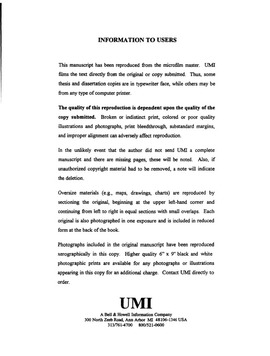| dc.contributor.advisor | Green, Gary, | en_US |
| dc.contributor.author | Thornbrugh, Jean Lorraine. | en_US |
| dc.date.accessioned | 2013-08-16T12:30:00Z | |
| dc.date.available | 2013-08-16T12:30:00Z | |
| dc.date.issued | 1998 | en_US |
| dc.identifier.uri | https://hdl.handle.net/11244/5629 | |
| dc.description.abstract | There is a serious need to understand the effects of barriers and facilitators on patterns of participation in adult education by blue-collar workers. Analysis of these patterns experienced by production and skilled trades workers in an industrial setting can help explain why this very important segment of the U.S. population participates the least. | en_US |
| dc.description.abstract | The survey instrument was administered to a population of 690 production and skilled trades workers at an industrial/manufacturing site; results are based on a 45% return rate (313 responses). A five-point Likert scale was utilized ranging from "never" (1) to "almost always" (5) to examine 16 potential barriers and 12 potential facilitators to participation in adult education activities. The respondents were separated into two groups for testing: (1) the analysis sample (75% of the total respondents) and (2) the "hold-out" sample (25% of the total respondents) for validation purposes. | en_US |
| dc.description.abstract | A survey instrument designed by Alan Hanson and James DeMuth was used to conduct a study on U.S. licensed pharmacists to determine facilitators and barriers to pharmacists' participation in lifelong learning. This same survey instrument was modified and used to identify barriers and facilitators to participation in adult education activities experienced by blue-collar workers. | en_US |
| dc.description.abstract | Disincentives continue to plague these workers from participating in adult education activities. The costs are high in terms of job, family and time constraints due to overtime and scheduling/shift work and the rewards and recognition for participating in adult education activities are few. | en_US |
| dc.description.abstract | Comparisons were made to early studies and specifically to the Hanson & DeMuth study on pharmacists. More than half of the total 28 variables tested indicated a degree of dependence on participation; the factor analysis derived four barrier factors and three facilitators factors from the original 28 variables; the discriminant function analysis identified six variates and produced a prediction accuracy of 79% (validation group) and 78% (analysis group). | en_US |
| dc.description.abstract | The greatest barrier experienced by adult education participants was "job constraints" (Mean = 3.25) and the greatest barrier experienced by non-participants of adult education was "low priority" (Mean = 3.06). The greatest facilitator for participants was "personal desire" (Mean = 3.41) and the greatest facilitator for non-participants was "ease of convenience" (Mean = 3.14). Simple statistics; chi-square test for independence; correlation statistics; factor analysis; discriminant function analysis; hypotheses testing (using t test) for mean scores; and open-ended question results are reported with other significant findings relative to demographic variables. | en_US |
| dc.format.extent | x, 259 leaves : | en_US |
| dc.subject | Motivation in adult education. | en_US |
| dc.subject | Working class Education. | en_US |
| dc.subject | Education, Adult and Continuing. | en_US |
| dc.subject | Sociology, Industrial and Labor Relations. | en_US |
| dc.subject | Adult education. | en_US |
| dc.subject | Economics, Labor. | en_US |
| dc.title | Barriers and facilitators to participation in adult education experienced by industrial workers. | en_US |
| dc.type | Thesis | en_US |
| dc.thesis.degree | Ph.D. | en_US |
| dc.thesis.degreeDiscipline | Department of Educational Leadership and Policy Studies | en_US |
| dc.note | Major Adviser: Gary Green. | en_US |
| dc.note | Source: Dissertation Abstracts International, Volume: 59-04, Section: A, page: 1045. | en_US |
| ou.identifier | (UMI)AAI9828782 | en_US |
| ou.group | Jeannine Rainbolt College of Education::Department of Educational Leadership and Policy Studies | |
